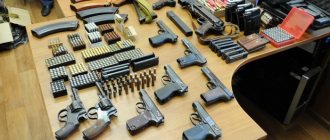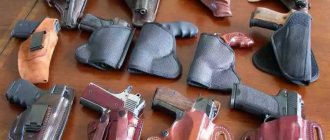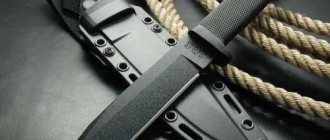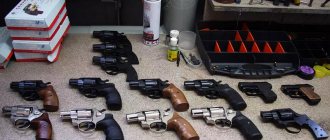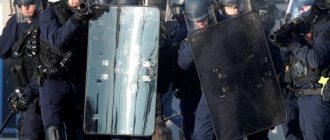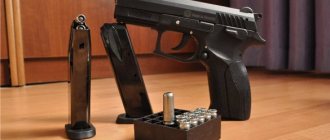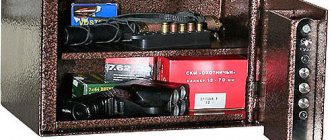When thinking about issues of the legality of owning firearms, it is necessary to clearly understand the root reasons why the state is trying to establish complete control over civilian weapons. Approximate calculations show that for every tenth resident of Russia there is one weapon. Moreover, this unit is kept in private hands.
The public has been fighting for so long for the right to arm themselves for self-defense that they finally have that right. Sad statistics show that the crime rate has not decreased, and the number of crimes committed with the use of weapons has even increased.
The state, on the one hand, legalizes the purchase of traumatic weapons, and on the other hand, it tightens the requirements both for the owners and for the models themselves from the category of firearms of limited destruction. The main emphasis is on ensuring control over the manufacture, acquisition, carrying and storage of weapons. These responsibilities are assigned to the licensing system, which today exists under the auspices of the VNG of the Russian Federation. The main measures to ensure the above control are registration and licensing.
Legal basis for gun ownership
The main law that regulates the rules for the acquisition and storage of civilian weapons is the Law “On Weapons,” which came into force in 1998, and is currently relevant in its latest edition. According to one of the articles of this law, owners of traumatic weapons, which are defined as firearms of limited destruction, are required to have a license. The fact is that licensing is a unique way to establish the possibility of giving a citizen the right to acquire and carry weapons.
The licensing procedure requires documentary confirmation of the applicant’s compliance with the requirements. Having collected the necessary documents, the citizen receives permission to purchase trauma equipment. After this, within the established time frame, the barrel must be registered and a license to store and carry it obtained. Otherwise, arms trafficking is considered illegal.
This law stipulates not only the licensing requirement, but also defines standards for traumatic weapons. This is a firearm designed to fire special traumatic cartridges. It is not aimed at hitting a living target or causing significant damage to it. The muzzle energy of an authorized weapon must not exceed 91 J. The following requirement is formulated for a pistol clip or revolver cylinder. The magazine should not hold more than 10 rounds. The trigger mechanism of the pistol can be of a double type, that is, firing by self-cocking is possible, but firing in bursts in automatic mode is excluded.
Another important document is government decree No. 814, the latest version of which was adopted on May 12, 2018, which establishes measures to regulate the circulation of civilian weapons. Among other things, it is determined that citizens have the right to carry traumatic weapons to ensure their own safety. The same resolution approves the rules for the circulation of weapons.
Who was left without a license
The question of what the storage of traumatic weapons without a license can lead to does not have a clear answer. The fact is that responsibility for the lack of a permit largely depends on the actions of the citizen himself, as well as on the circumstances that led to the illegal trafficking of weapons. We will try to simulate several life situations in order to subsequently determine which article of the criminal or administrative code is applicable in each specific case.
- The first case implies that the traumatic pistol was purchased legally, and the buyer presented permission to purchase the traumatic pistol. In addition, the weapon is registered, and the citizen is its official owner. By coincidence, he did not manage to renew his license on time. This means that from the moment it ends, the possession and, especially, the use of weapons is illegal.
- Let’s imagine that a citizen with an expired license did not apply for it for fear of being punished. Gradually the period of delay will increase. Finally, it will begin to be calculated not in days or months, but in years. Judicial practice shows that the consequences will depend on the length of delay, as the judge assesses the citizen’s desire or unwillingness to return to the law.
- The owner of the weapon followed the legitimate path, he collected all the documents and received permission to purchase the weapon, but after the acquisition he did not register the barrel and was left without a license. This is a more serious violation, which indicates a deliberate disregard for the provisions of the law. You won't be able to stay in the shadows for long. Even if you are not caught red-handed by a law enforcement representative, “good-natured” neighbors or “faithful” friends can make an information call to the police.
- If you don't have permission, they won't talk to you (not literally) in any gun store. The only way to purchase weapons is the black market, which, unfortunately, is still thriving in our country. Naturally, there can be no question of any legality, and since no documents confirm the nature of the transaction, the citizen may be charged not with the purchase, but with the sale, which is already fraught with a criminal case.
If you look at the questions asked by visitors to weapons forums, and take only topics related to the illegal carrying of traumatic weapons, then at first glance it may seem that each has its own objective reason, so such situations should be simulated several times more. But in fact, we have described the main components of violations of the law, and the details and details of their manifestation are no longer so significant.
Violation of registration deadlines
The first case considered will be interpreted in exactly this way.
- On the one hand, this is not such a serious violation, because the citizen did not have the intention to commit a crime, but violated the law as a result of negligence.
- On the other hand, punishment for delay cannot be avoided. One month before the license expires, the owner must contact the OLRR with an application for its renewal. If this deadline is not met, and the license is still valid for several days, then a fine may be imposed on the citizen.
Punishment for violating the deadlines for registering weapons is provided for in Article 20.11 of the Code of Administrative Offenses of the Russian Federation. This article states that for failure to comply with the deadlines for registering a weapon or renewing a license, the violator faces a fine of 1,000 rubles to 3,000 rubles. Practice shows that if the delay lasts several weeks, the minimum fine will be imposed.
Long license overdue
If the period for re-issuing a license has long expired, and the regulatory authorities have become aware of the storage of traumatic weapons, then the owner will face a more severe punishment. First of all, his actions can also be considered under Article 20.11 of the Code of Administrative Offences, only the maximum fine will be imposed. The difficulty lies in the fact that there is no clear definition between an intentional or unintentional violation of the law. Judicial practice shows that an offense with a delay of several years can be reclassified under a more severe article.
Article 20.8 of the Code of Administrative Offenses determines the punishment in case of violation of the rules for the circulation of weapons. In particular, a citizen who keeps traumatizing equipment at home can theoretically receive one of the following punishments:
- A fine ranges from 3,000 rubles to 5,000 rubles, and the weapon can be confiscated until the permits are fully restored.
- Temporary seizure of weapons and administrative arrest. Its duration is determined individually and ranges from 5 days to 15 days.
- For the official, the amount of the fine increases. The range is from 10 to 50 thousand rubles. In parallel, this will be followed by deprivation of the right to obtain a license for three years. The weapon is confiscated.
In reality, the matter will not come to an arrest, but the weapons will be taken away. They will give you the opportunity to complete all the paperwork and issue a fine. A personal conversation is not excluded, during which the violator will be proven that compliance with the law is an important component of gun ownership.
Checking control services
Let’s assume a situation where a person carrying this type of weapon is intoxicated.
The punishment for illegally carrying weapons will be:
- if a law enforcement officer refused to undergo a medical examination procedure;
- If the person refuses, he will be charged with violating the rules of carrying weapons.
The liability will be deprivation of the right to purchase for 12 to 24 months. Accordingly, the person will be deprived of both a license and means of self-defense.
But there are routine checks by police officers of persons who own traumatic weapons. The main goal of this type of inspection is to control the storage method.
When visiting a residential building in which a licensee resides while he or she is away from the premises, officers will ask to present the weapon to verify license plates. Moreover, if family members resort to such a trick, the licensee will lose the weapon with the wording “failure to comply with storage conditions.”
No one other than the person who received the permit can know where the key to the safe or the code for opening the safe is located, otherwise the inspection by the control services will be accompanied by confiscation.
No license for traumatic weapons
If a license is missing and has never been issued, it is not for nothing that we have divided this case into two types. First, let's talk about legally acquired weapons. Even before 2010, for illegal possession of weapons, including traumatic weapons, the degree of punishment was determined by Article 222 of the Criminal Code of the Russian Federation. Since then, the content of the article has not changed, but regarding injuries acquired legally, it has ceased to be used. The violator faces punishment under Article 20.8 of the Code of Administrative Offences. But there is one nuance here.
Aggravating circumstances can significantly change the measures taken. If the owner carried a weapon while intoxicated, the barrel will be confiscated without the possibility of return, and the offender will not be able to obtain new permits for several years.
Trauma is allowed only for self-defense. When a gun owner's actions exceed the limits of carrying regulations, such violations may result in a fine, the amount of which is determined by regulatory authorities. However, if it turns out that a citizen used trauma to threaten the lives of others, then his act is considered by the criminal code. Article 119 of the Criminal Code of the Russian Federation defines punishment for a threat to life in the form of imprisonment for two years.
Is it possible to avoid punishment
A person convicted of illegal possession of traumatic equipment bears administrative liability. More details in paragraph 6 of Art. 20.8 Code of Administrative Offences. The sanction provides for the seizure of both the barrel itself and the cartridges.
If the weapon was purchased illegally, that is, by hand, you can protect yourself in the following way. It is necessary to draw up a statement in advance to law enforcement authorities stating that this item was found on the street, and the acquirer intends to hand it over in accordance with the requirements of the law.
When law enforcement officers demand that you hand over the weapon, you should present this document and explain that the owner has not done anything illegal.
Of course, this method cannot be called honest, but otherwise a fine is 100% guaranteed.
To mitigate the punishment in case of delay in obtaining a license, legal experts advise considering the offense under Art. 20. 11. If there is a good reason, the offense will be considered minor, and the proceedings will be stopped.
There is liability for illegal storage of traumatic items. The violator may first be warned and then fined or put under arrest. Therefore, you should renew your permit on time.
Illegally purchased weapons
The most difficult case involves carrying weapons that were purchased on the “black” market.
- On the one hand, carrying a traumatic weapon without permission should be punished only under an administrative article.
- On the other hand, the state takes a rather tough approach to the issue of suppressing illegal arms trafficking. This is understandable, since most crimes are committed with the help of unregistered guns.
The “black” arms market, working for criminal organizations, creates a potential danger to society on a global scale. Even if the sale of trauma products is organized, the degree of danger is not reduced. Criminal elements prefer to buy a barrel inexpensively, convert it into a combat weapon, use it once and get rid of it. Naturally, the state will strictly suppress the production and sale of illegal weapons by all competent departments.
The fate of the unfortunate owner who bought a traumatic pistol without documents in a gateway is difficult to predict. Everything will depend on his desire to cooperate with the investigation. In the worst case, he may be accused of selling illegal weapons, and this is punishable under Article 222. The maximum possible consequences are a fine of 80 thousand rubles and imprisonment for 4 years.
This is approximately what the distribution of crimes looks like under administrative and criminal articles. In practice, everything depends on the specific case. But violation of the law related to the circulation of weapons has always been considered severely punishable, so owners of even traumatic weapons prefer to vigilantly monitor compliance with the rules for storing and carrying firearms.
General information about storage
Violation of the procedure for storing bladed weapons does not entail the application of legal sanctions. This is due to the fact that there are no strictly legal rules on how to store such products. But the following universal rules can be identified:
- mandatory presence of covers;
- insulate the product out of the reach of children and third parties (it is better to use a safe or a lockable cabinet).
But they can be punished for illegally carrying or manufacturing bladed weapons. You can authorize the transportation of such weapons:
- persons who require knives in the performance of official duties;
- if the products are necessary for use in hunting, but only during the period of permission to hunt;
- military, if the product is an award or trophy;
- antique items, but only during cultural events;
- as self-defense.
All other cases of exploitation may be subject to legal sanctions.
Important! Not in every case you will need a permit to operate and possess bladed weapons. For example, hunters who have a firearms permit also have access to the sale of knives.

